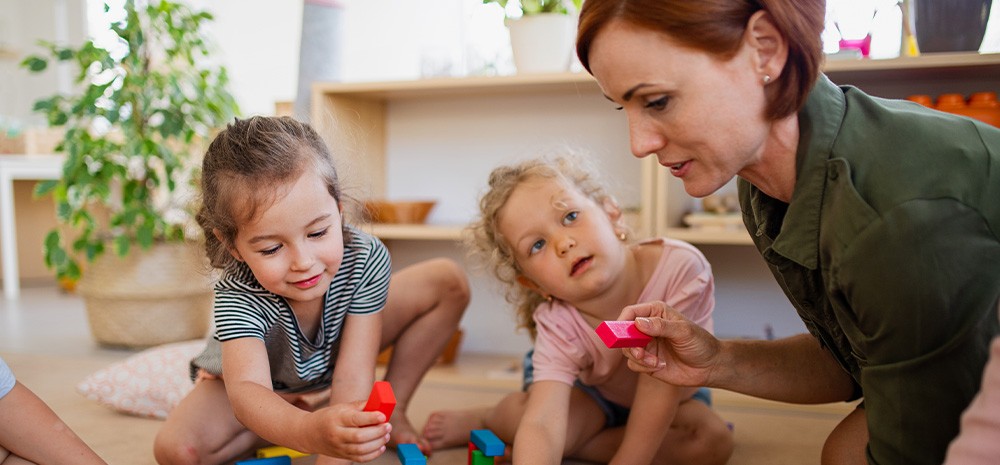An Expert Insight into the EYFS Statutory Framework



In this blog, Sue Asquith, award-winning adviser on early childhood development, explains key aspects of the ‘Early years foundation stage (EYFS) statutory framework’, including background to publication the document and priorities for practitioners in meeting its requirements.
The framework is statutory guidance produced by the DfE. It was first published by the Department for Children, Schools and Families (DCSF) and came into force in 2008. This was the first time that government guidance for early years settings set the standards for learning, development, and care for children from birth to five for all providers. Previously, there had been separate national standards for different types of early years settings.
The ‘EYFS statutory framework’ is occasionally revised and updated. The latest version was published 12 July 2023 and came into force from 4 September 2023.
The document consists of 53 pages and is divided into three sections:
There are also two annexes at the end of the document:
Furthermore, in addition to the statutory framework, there are two main non-statutory guidance documents providing more information:
The EYFS statutory framework is mandatory for all early years providers in England. Childminder agencies (CMAs) are also under a duty to have regard to the framework in the exercise of their functions.
Ofsted and inspectorates of independent schools have regard to the EYFS when carrying out inspections to report on the quality and standards of provision. Inspection reports may include actions, if early years providers fail to meet any of the stipulated safeguarding and welfare or learning and development requirements.
It’s an offence for a provider to fail to comply with a welfare requirements notice, so it’s important for registered providers to be familiar with all the requirements, including any changes or specific events which need reporting to Ofsted.
The EYFS statutory framework is given legal force under section 39 of the Childcare Act 2006.
Within all three sections of the framework, the learning and development, assessment, and safeguarding and welfare requirements are indicated by the use of the word ‘must’.
Throughout the EYFS statutory guidance, you will also find provisions indicated by the word ‘should’, which early years providers must ‘have regard’ to. The statutory framework states that ‘having regard’ means that early years providers must take points into account when providing early years provision and should not depart from them unless there is good reason for doing so.
The EYFS statutory framework states:
‘Every child deserves the best possible start in life and the support that enables them to fulfil their potential. Children develop quickly in the early years and a child’s experiences between birth and age five have a major impact on their future life chances. A secure, safe and happy childhood is important in its own right. Good parenting and high quality early learning together provide the foundation children need to make the most of their abilities and talents as they grow up’.
Early childhood is a crucial time. It’s when the building blocks for lifelong emotional and physical health are laid. It’s also a time when the foundations of children’s brains are made. Construction of the brain architecture begins before birth, but amazingly, more than a million new neural connections are formed every second in the first year of a baby’s life.
Research also tells us that experiences within the first five years have a lifelong impact, and that the first three years are the sensitive period for children to develop communication and language.
The EYFS seeks to provide:
Early years teachers, educators, and practitioners need to gather starting-point information and spend time getting to know each unique child. Using information and observations from parents/carers along with your own observations will help you form a picture of each child’s likes, dislikes, interests, strengths, and next steps to help you to plan appropriate and exciting learning opportunities. These need to be planned so that children sequence their knowledge and skills and build upon their learning over time. Parents/carers should be kept up to date with their child’s progress, and be supported to guide their child’s development at home.
Ongoing observations and assessments by knowledgeable practitioners are key to supporting children’s learning and development; any concerns about a child’s progress must be discussed with the child’s parents/carers so that you can agree on how to support the child. If there are significant concerns about a child’s learning and development or an identified special educational need or disability, you will need to involve parents/carers, your SENCO, and any other health professionals (as appropriate) to develop a targeted plan to support the child.
In addition to supporting children’s learning and development, it’s important that we’re alert to any issues of concern in the child’s life at home or elsewhere. All staff need to be trained to understand your child protection/safeguarding policy and procedures, and they need to have up-to-date knowledge of safeguarding issues. Training must enable staff to identify signs of possible abuse and neglect at the earliest opportunity, and to respond in a timely and appropriate way.
Safeguarding is a proactive measure to ensure that everyone is as safe as possible. If you look up the definition of safeguarding, you will find one along the lines of ‘protecting people’s health, wellbeing and human rights; enabling them to live free from harm, abuse and neglect’. Safeguarding babies and young children is an integral part of providing high-quality childcare and education.
Safeguarding children is everyone’s responsibility and a golden thread running through everything that we do in early years. The EYFS framework requires providers to take all necessary steps to keep children safe and well; ensuring that you meet all the EYFS safeguarding and welfare requirements, as well as the assessment and learning and development requirements will help us to achieve this.
The statutory guidance is occasionally updated and refreshed. It was updated in 2012, 2014, 2017, 2021 and the most recent version in 2023. From 4 September 2023, the following three changes apply:
If you’re concerned about keeping up to date with the latest education policy, practice and research, consider a membership with The National College. Not only does it provide access to thousands of professional development resources for all staff, but also enables leaders to create training programmes precisely tailored to individual and collective needs, to help ensure compliance and drive up standards.
DfE, Early years foundation stage (EYFS) statutory framework - https://www.gov.uk/government/publications/early-years-foundation-stage-framework--2
DfE, Development Matters, 2023 - https://www.gov.uk/government/publications/development-matters--2#full-publication-update-history
Early Education, Birth To 5 Matters: non-statutory guidance for the Early Years Foundation Stage - https://birthto5matters.org.uk/